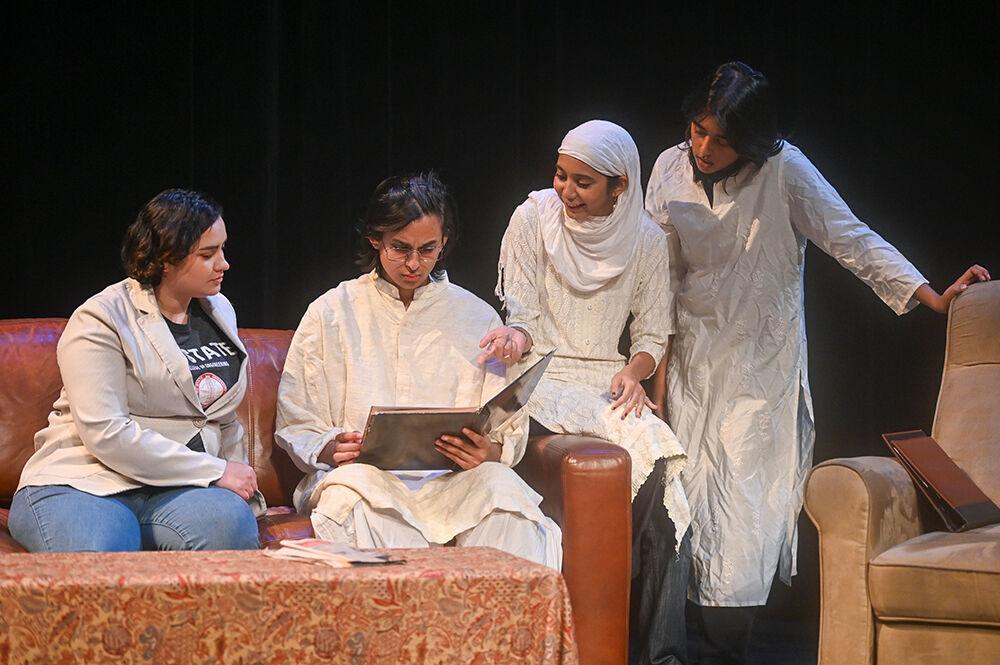Following an immigrant family’s experiences in a post-9/11 society, “What We Grew Up With” tells a multigenerational story in an hour that leaves audience members thinking about society as they walk out of Kennedy-McIlwee Studio Theatre.
Kiran Soma, a fourth-year studying chemistry and communication media, won the 2023 Creative Artist Award in Theatre for “What We Grew Up With,” and was given the chance to turn the script into an on-stage production.
Before opening night, Soma said he attended a reading of the Creative Artist Award-winning play his first year on campus, and it felt like a full-circle moment.
“It’s just kind of surreal thinking that I sort of started my college experience by going to a reading of that play and then getting to see what it looked like when it was produced,” Soma said. “And now it’s my play that’s going through the same process.”
“What We Grew Up With” tells the story of an immigrant family navigating life in America in a society that views them as the other, treating them like terrorists in the aftermath of 9/11. The story is presented over the lifetimes of the main characters Advit and Divya, progressing from their childhoods to adulthood.
One of the opening scenes of the play strongly resembles a story stand-up comedian Hasan Minhaj recounted in his Netflix special “Homecoming King” in which his family received a threatening phone call accusing them of being terrorists and then had their car windows smashed.
Soma discussed the vulnerability of presenting this story to the greater campus community on account of the sensitivity of this subject.
“This is something that I’m super nervous about,” Soma said. “This is one of the more vulnerable pieces of writing that I’ve put out there because it touches on my own experiences and the experiences that my family and my friends have had. So it makes me nervous to put that story out there — but then again, I am super excited to share this work with the rest of the campus community.”
The show’s director, Usha Bajpai, said the story felt personal to her.
“This play is very close to my heart, as I can relate to the story as an immigrant myself,” Bajpai said. “We moved here 25 years ago, and you know, what the characters go through is very relatable to immigrants — the immigrant parents and the children born to them. As an immigrant, you are leaving your family behind, you’re settling into a new country with a different culture, different values and different way of thinking from what you have been raised with. Those challenges are all, in their own subtle ways, highlighted in this play.”
Bajpai said there were universal elements of the play, even for those who may not see themselves portrayed in the production.
“I’m sure it will relate to everyone, not just to immigrants,” Bajpai said. “I think the way the story was wound by Kiran does a good job with that. It talks about family bonding, it talks about family conflicts, it’s about the feelings of trying to fit in and be accepted, of being torn apart. Everything is so well-portrayed, and I give kudos and credit to Kiran for doing that.”
Bajpai said she hopes the play is thought-provoking to audience members.
“For the immigrants or first-generation kids, children of immigrant parents, I would hope this encourages them to embrace their cultural heritage and to be proud of their roots,” Bajpai said. “I would also hope this encourages other people to set aside their prejudices, to live peacefully, to respect other cultures and values.”
Bajpai said she enjoyed working with University Theatre on the project.
“I just want to say that as an outsider, an outside guest director coming to NC State, I am so impressed,” Bajpai said. “State has a great theater department and great actors. I cannot tell you how impressed I am by the talent that State’s theater department has. Each and every actor is very gifted, and everyone is just so talented.”
Soma said he’s grateful to University Theatre for allowing him to present his work.
“I would really just like to say thank you to the University Theatre for allowing me to share this story,” Soma said. “For allowing my voice to be heard on campus and doing such a good job with workshopping and now putting on the play. Just a huge thank you to the University Theatre and to NC State as a whole.”














